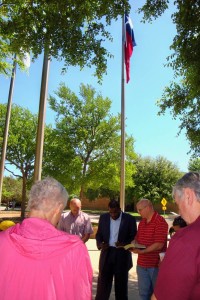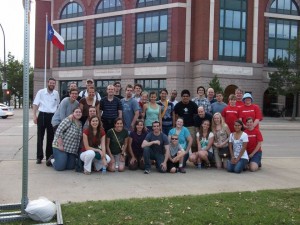Our friend Adam Evans was interviewed recently for a paper at the University of Oklahoma. A student interviewed Adam about his evangelism at OU and then used the interview in paper for her class. The paper discusses evangelism as presented on the campus. I am posting the paper here with Adams permission:
Amidst shouts condemning students to hell, one man parks himself on top of a bench across from the Jeannie Rainbolt College of Education and joins in the shouting- but to tell students what he believes is good news.
As warm weather lures middle-aged and graying men like “Preacher Bob” to stand on stools and turn on microphones to bash homosexuals and soldiers, Adam Evans, Oklahoma City native and evangelist at OU, turns on a voice recorder, pulls up the Bible on his Kindle reading device and tells students how he cares for them and wants them to go to heaven.
Evans and his fellow evangelists will be storming the campus in force soon, warm weather and shady trees pulling them from hibernation to preach to OU’s students. While the visits can spur arguments and bitter feelings, like a March 26 sermon that ended in a group of 20 students pitted against an evangelist, Evans’ visits give many students a positive view on evangelism.
Instead of drawing a crowd with negative words, Evans uses promises of love from God to get the attention of students, a stark contrast from similar campus visitors.
“I’ve heard of others being offensive for the sake of being offensive. There can’t be good news without bad, but [using the good news] is how Jesus did it. Others need to do it that way,” Evans said.
Evans evangelizes at OU because of how accessible listening ears are.
“Campus ministry is what I love to do,” he said. “I go out to the world with good news, and I go where the fish are, like a good fisherman.”
This mix of listening ears and messages of God can strike a bad chord for some students, including Tyler Wilson, a university college freshman, who was told he was going to hell and then listened as his friend was told her active-duty military friend was also going to hell.
Wilson said that statement darkened students’ moods and caused him to stop listening to the speaker. He said he prefers Evans’ approach, because it comes off respectful of the variety of cultures and religious backgrounds found on campus.
The difference in approaches also determines how Daniel Pons, university college freshman, views evangelists’ effectiveness.
“Scolding students will never convince them they need Jesus,” Pons, a member of the Baptist Student Union on campus, said. “They need to hear the truth, but preaching out of humility, love and genuine concern would … be more effective than criticism and negativity.”
Evans prays for that humility and love before he takes the stage on his bench just off the South Oval.
“I’m always prayed up. God just stirs me up,” Evans said.
Just behind Evans, students can usually see a member of Evans’ evangelical team holding various signs about accepting Jesus. Evans said these members are sometimes the targets of heckling from passers by, but the comments don’t faze them.
“We do it with joy,” Evans said. “We’ve never had anyone argue with us.”
Evans has, however, had a student approach him after a sermon for a positive reason.
“It wasn’t repentance or faith on the spot, but seeds being planted. We encouraged him to read Psalm 51,” Evans said.
The psalm Evans prescribed the student depicts someone acknowledging the sacrifices Christians believe Jesus made for humanity and calls to readers to spread that news.
“All [of the evangelists] really do have good news to share,” Pons said. “The reality of what Jesus did for us is fabulous. [Evans] just does a better job of keeping that as a key point in his messages.”
Evans uses the book of Philemon to keep himself positive.
“And I pray: the sharing of your faith effective,” reads part of the text, a quote Evans keeps close to remind himself that what he does is important to him.
“If I had the cure to cancer under my bed and didn’t share it, that’s depraved indifference. That would be wrong. If I saw a kid drowning, I wouldn’t just say ‘that’s not my kid’, I’d jump in and swim to him and save him. [Evangelism] is a mission to seek and save” Evans said.
An evangelist from South Africa, Keith Daniel, inspired Evans to share the gospel during a sermon he attended in 2006.
“He talked about soul winning,” Evans said. “A friend of mine said I had to hear him. He turned my world upside down.”
Daniel’s positive sermons have viewed over 2,000 times on Classic Holiness Sermons and downloaded just as frequently on Sermon Index. On Sermon Index, reviews of his sermons note Daniel’s words as engaging, uplifting and penetrating.
As students roll their eyes, crowds dissipate and other evangelists collapse their stools and power down their microphones, Evans thinks of one of his favorite poems, written by evangelist William Chalmers Burns.
“Time is short; sinners beware. Nor trifle time away,” Burns writes- words similar to Evans’, who can be heard telling students they don’t have much time left to accept Jesus, especially when compared to eternity and that they need to be thinking of how they’ll be spending eternity.
“The light of the world will soon go out, we must get to work,” Evans said.








